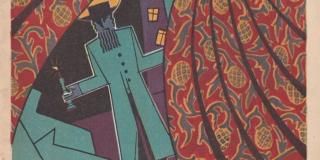
Pinḳas ḥevrat leḥem la-reʻuvim ṿe-hakhnasat orḥim la-ʻaniyim
Pinḳas ḥevrat leḥem la-reʻuvim ṿe-hakhnasat orḥim la-ʻaniyim [Registar of the Society for Providing Bread to the Hungry and Hospitality for the Poor].
Illuminated manuscript on paper
Jerusalem, 1890
The deeply religious, yet impoverished Jewish communities, residing for centuries in historical and spiritual centers such as Jerusalem, Sefad, Tiberias and Hebron, had been the focus of philanthropic efforts of the American Jews beginning in the second half of the 18th century. Supporting these communities was considered a sacred duty and underlined their enduring significance to all the Diaspora Jews. Situated in the area universally recognized as the Holy Land, revered by all three Abrahamic religions, they exemplified a living connection to ancient biblical history.
The tradition of soliciting funds for the Jews who lived in this region, also commonly geographically defined as Palestine, can be traced back to at least the 15th century. Typically, a special trusted person (or shadar, the Hebrew acronym for “shaliah de-Rabanan” meaning “emissary of the Rabbis”) was dispatched to the Diaspora Jews to persuade them to donate money to their economically struggling brethren.
This beautifully illuminated manuscript is a document entrusting one such emissary, Rabbi Joseph ben Baruch Zevi Horowitz, to fundraise for feeding and housing the poor in Jerusalem. The manuscript, dated 1890, contains records in Hebrew, Yiddish and English. It includes approbations by many respectable rabbis for Rabbi Horowitz’s appointment. It also features a special appeal in Yiddish signed by three women from Jerusalem and addressed to their counterparts in the Diaspora. The English text attests to the reliability of Rabbi Horowitz and emphasizes his previous accomplishments in India and Australia in 1878. Apparently, Rabbi Horowitz carried this mandate with him during his trips to solicit funds in the United States, especially in California, as well as in Brazil and even South Africa’s Cape Town.
The acting British Consul in Jerusalem confirmed the authenticity of all signatures and seals.
The title page is elegantly illuminated in gold and red ink with traditional ornaments, temple columns, and arches. Relevant biblical quotations, in Hebrew, are incorporated into the design of the page. The quotes inscribed at the top in red ink and in the shape of an arch are from the book of Isaiah 58:7-8: “It is to share your bread with the hungry and to take the wretched poor into your home [...]; Then shall your light burst through like the dawn”. The quote from Psalm 118:20, placed beneath the red arch, reads: “This is the gateway to the Lord—the righteous shall enter through it.”
The New York Public Library believes that this item is in the public domain under the laws of the United States, but did not make a determination as to its copyright status under the copyright laws of other countries. This item may not be in the public domain under the laws of other countries. Though not required, if you want to credit us as the source, please use the following statement, "From The New York Public Library," and provide a link back to the item on our Digital Collections site. Doing so helps us track how our collection is used and helps justify freely releasing even more content in the future.






